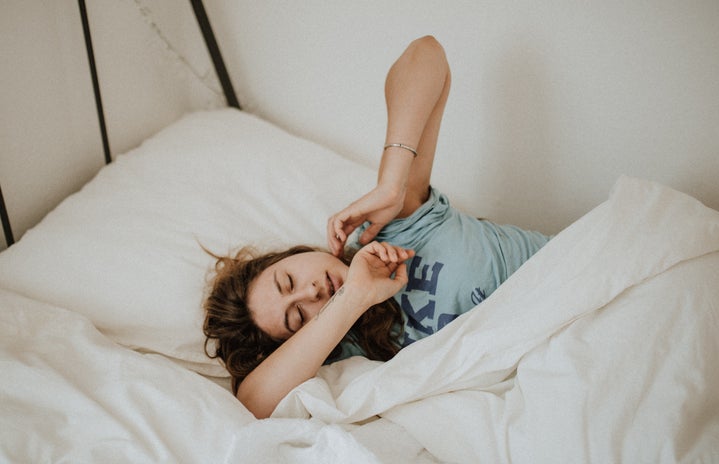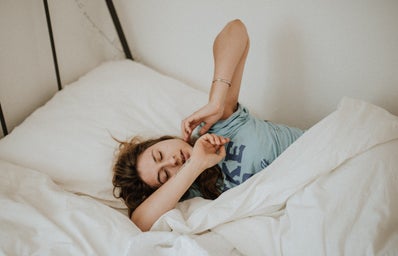In support of University Mental Health Day on Thursday 5th March, this week, the Her Campus Nottingham team are writing content on the topic of mental health to help raise awareness of mental health in higher education.
Mental health is something which is thankfully being talked about more and more by the world around us. When I started to think about what I could recommend as a tool to support positive mental health based on my own experience, I was surprised that I found it so difficult to come up with anything I regularly do to take care of my own mental wellbeing.
So, I started to think about the areas of my own life which could benefit from some active management of my own mental health. Within seconds, I had identified the issue affecting my wellbeing the most: my terrible relationship with sleep.
I have always been someone who needs the perfect conditions in order to sleep – if the room isn’t pitch black, silent, or even the right temperature, then I can kiss goodbye to my 8 hours and say hello to a night of tossing and turning, juggling a thousand mismatched thoughts in my head.
I experience sleepless nights at least twice a week, and I have recently noticed that my stress levels and general mentality have a huge impact on whether I manage to sleep at night. A lack of sleep leaves me groggy in the mornings, needing copious amounts of coffee just to make it through my 9am lectures and generally slowing me down throughout the day. As you can imagine, it’s not the most ideal situation to find yourself in during your final semester.
While the temperature of my room can be solved with a quick fiddle with my thermostat, and unwelcome noises cancelled out through investing in some quality earplugs, the real issue affecting my sleep is my inability to switch off my mind at night time.
So, I decided to take matters into my own hands and see if using a mindfulness app could solve my sleeping problem more effectively than a max-strength Nytol.
I already subscribe to Spotify Premium for £4.99 a month, and with their student package they offer free access to the full Headspace app. Luckily for me, the creators of Headspace have also placed getting a good night’s sleep high on their agenda – citing studies that connect improved sleep with a greater sense of wellbeing and mental clarity on their website.
The Headspace app focuses on getting better sleep in 3 ways: guided meditations, ‘sleepcasts’, and even a 30-day sleep course. The meditations and sleepcasts are aimed at helping to induce sleep in the moment, whilst the sleep-course helps to improve the relationship you have with sleep more long-term.
As for the sleep-course, I am yet to see its impact since I have only been using the app for around two weeks, but I’m finding it interesting to be consciously thinking about my sleep during the daytime, and I’ve noticed that I’m paying more attention to the things which are making me feel more stressed and could affect me drifting off that night. The guided meditations are definitely relaxing, as the soothing voice of a narrator quietly instructs you to breathe, count, or visualise certain things which make you feel calm; however, I do find some of the meditations to be slightly counteractive due to the repeated instructions… keeping my mind alert.
For me, the shining star of Headspace’s sleep aids has to be the ‘sleepcasts’. The 45 to 55-minute audio clips document different locations, from lakes to deserts to launderettes, and are customisable for your own experience. Each sleepcast has a narration of a specific set of surroundings, but the app allows you to turn the volume of the voice up or down (or even off), meaning you can tailor the experience to create the right level of background noise to help you drift off to sleep. I usually turn the narration down to the point where it is barely audible, but so that I can still hear the sounds of the background environment. Each ‘sleepcast’ is different, and the individual casts are remixed every night so that no experience is the same, and your mind doesn’t become accustomed to the same narrative.
I am eager to keep using the app to see whether it can completely cure my restless sleeping, and can honestly say that the sleepcasts have been a welcome addition to my night time routine. In the same way that ASMR videos work for some people, I find that the white noise of the clips creates just enough of a soothing distraction that my mind can switch off long enough to help me go to sleep.
From catching up on my much needed rest recently, I have noticed myself becoming a little more productive and relying on coffee slightly less to get through the early mornings. I’m feeling more positive about starting my days, and in turn fitting more activities into my week. That’s not to say I’m getting a full 8 hours every single night, but I can see the difference that being well rested is having on my mental health and wellbeing, and would wholeheartedly encourage anybody else experiencing sleepless nights to invest in the Headspace app.
Rating: 4/5



